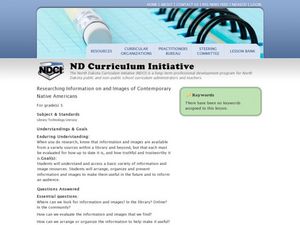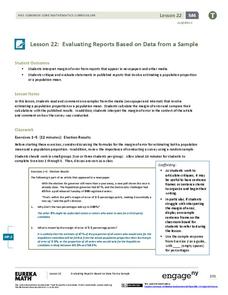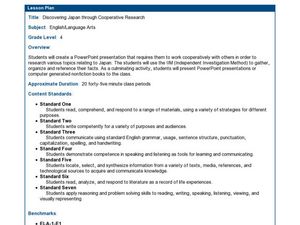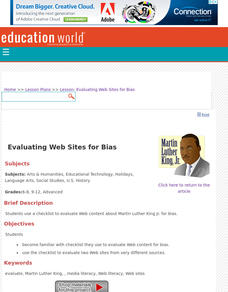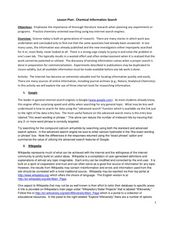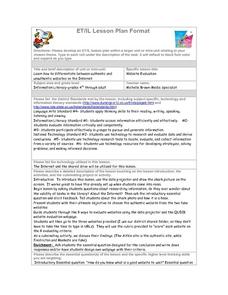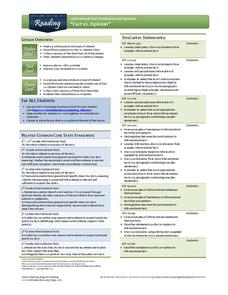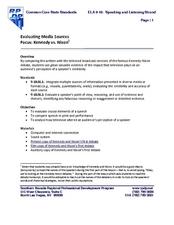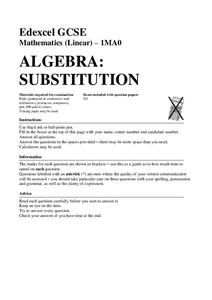Utah Education Network (UEN)
Evaluating the Format of Informational Text
Make your learners aware of the advantages and disadvantages of using different media in presentations. This straightforward resource evaluates media formations such as print, digital text, and videos. Although the subject of ballet is...
Curated OER
Researching information on and Images of Contemporary Native Americans
Research information and find pictures of Contemporary Native Americans in order to help 3rd graders understand what images are available from a variety of resources. They will present their research and pictures to the class. In turn,...
Newseum
E.S.C.A.P.E. Junk News
Fair, balanced, and reputable information? There's an acronym for that! Scholars learn the E.S.C.A.P.E. method for evaluating news sources. Then, pupils work in small groups to read and analyze a news story and discuss the activity to...
Curated OER
Information Problem Solving
Middle schoolers present information about an author of young adult literature using a HyperStudio stack.
History Teacher
Criteria for Evaluating Debate Performance
Behind every successful debate is a list of clearly stated criteria. Let your debaters know exactly how their performance will be evaluated with this packet that details the content, preparation, structure, and grading policy that will...
EngageNY
Evaluating Reports Based on Data from a Sample
Statistics can be manipulated to say what you want them to say. Teach your classes to be wise consumers and sort through the bias in those reports. Young statisticians study different statistical reports and analyze them for misleading...
Curated OER
A Way with Words
How do facts and opinions impact the news? After reading "How to Cover a War" from the New York Times, middle schoolers evaluate the claims in the article. They also consider the media's responsibilities in reporting during wartime....
EngageNY
Informally Fitting a Line
Discover how trend lines can be useful in understanding relationships between variables with a lesson that covers how to informally fit a trend line to model a relationship given in a scatter plot. Scholars use the trend line to make...
Curated OER
Discovering Japan Through Cooperative Research
Search a variety of sources to create a multimedia or book project about Japan. Learners use the independent investigation method to plan and conduct research about Japan. They use the information they discover to create a computer book...
Curated OER
Liberty and Security in Contemporary China
Upper graders consider contemporary Chinese economics, political viewpoints, and government. This unit covers a span of several class periods or six days, and engages learners in a variety of skills based activities. They conduct...
Curated OER
Evaluating Web Sites for Bias
Students become familiar with checklist they use to evaluate Web content for bias. They use the checklist to evaluate two Web sites from very different sources.
Curated OER
Communicating through Engineering Information Technology
Young scholars analyze prior labs by keeping a lab notebook. They share their lab notebook by electronically sending it to their classmates. Students demonstrate evaluation of other lab notebooks within the same classroom and those from...
Curated OER
Chemical Information Search
High schoolers research information using various internet resources. In this chemistry lesson, students demonstrate their ability to navigate websites and gather necessary information. They evaluate the potential usefulness of the...
Curated OER
Website Evaluation
Students examine how to differentiate between authentic and unauthentic websites on the Internet. They view and discuss a photo of a shark that is a hoax, then discuss the eight ways to evaluate websites. Students then evaluate three...
Curated OER
Information Security Basics
Students explore the five steps to becoming a security expert. In this information security lesson, students complete a tutorial and problem solve case studies to identify proper online procedures and safety.
Virginia Department of Education
Translate and Evaluate
Hopefully nothing gets lost in translation. Pupils translate between verbal phrases and algebraic expressions. They then use candy to determine what values to substitute into the expressions.
Newseum
Can I Trust the Creators?
It's easy to find information at the click of a mouse, but is it trustworthy? Pupils learn about the E.S.C.A.P.E. acronym for evaluating sources. Next, learners read a news story and evaluate its sources to determine credibility. Last,...
Newseum
Evidence: Do the Facts Hold Up?
Sometimes it's hard to escape bad information! Pupils learn the E.S.C.A.P.E. method for evaluating news sources and complete a worksheet to assess a news article using their new skills.
Newseum
Putting the Consumer's Questions to Work
Who, what, when, where, why, and how are good questions to ask when evaluating a source. First, scholars find two sources of information relating to a chosen topic. Next, pupils complete a worksheet to gauge the source's credibility....
For the Teachers
Fact vs. Opinion
Many informational texts are written as factual, but can your learners determine when an opinion is presented as fact? Have your kids read several articles on the same topic and record the statements that contain either facts or...
Southern Nevada Regional Professional Development Program
Evaluating Media Sources
Just how much influence did television have on the results of the 1960 presidential election? Media critics contend that the results were all about how the two candidates appeared on the screen. Give your young historians a chance to...
Scholastic
Consider the Source
Who is more trustworthy when it comes to marijuana: a high school student, or The National Institute on Drug Abuse? Sources matter when reading informational text. Help teenagers discern which facts are true with an activity that focuses...
Mathed Up!
Algebra: Substitution
The sixteen problems in this resource present opportunities for pupils to practice substituting into algebraic expressions. Scholars evaluate algebraic expressions for given values of the variables. In a few cases, class members need to...
EngageNY
Replacing Letters with Numbers
When did letters become the same as numbers? Scholars learn about substituting numbers for letters to evaluate algebraic expressions in the seventh part in a series of 36. The activity focuses on expressions related to geometry, such as...



